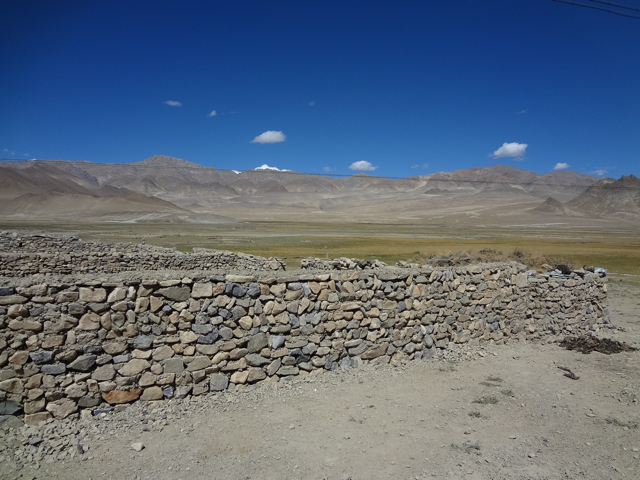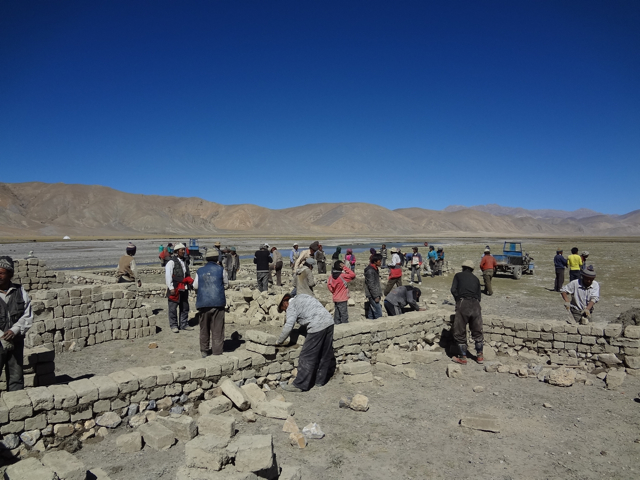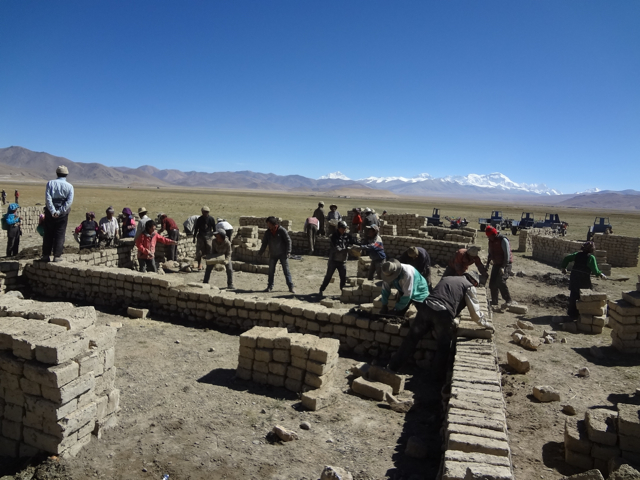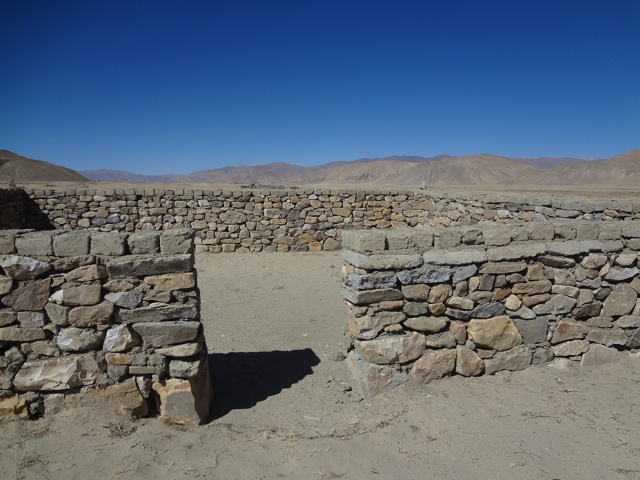
 In early August, 2012, the Pendeba Society reached agreement on transforming traditional sheep corrals projects with 5 villages (Enba, Chaga, Chazi, Didong, Meimu and Nailong) in Tingri and Nyalam Counties with support from local governments and communities. Except Nailong and Chaga Villages, the other four villages have completed the projects based on the communities’ practical situation and schedule. In total 64 sites of sheep corrals have been successfully transformed into new ones and put into use before winter arrived.
In early August, 2012, the Pendeba Society reached agreement on transforming traditional sheep corrals projects with 5 villages (Enba, Chaga, Chazi, Didong, Meimu and Nailong) in Tingri and Nyalam Counties with support from local governments and communities. Except Nailong and Chaga Villages, the other four villages have completed the projects based on the communities’ practical situation and schedule. In total 64 sites of sheep corrals have been successfully transformed into new ones and put into use before winter arrived.
Currently, most of local villagers still use traditional sheep corrals that are built by earth blocks dug from the wetlands. By doing so, local ecological environment is easily destructed and the sheep corrals are also less endurable and sustainable. To help end such situation, it matters a lot for the quality of sheep corrals after the transformation. The Society encouraged villagers to rebuild the corrals by rocks and stones. In villages where there is a lack of stones, they could use earth bricks. Sheep corrals that are built of rocks or earth bricks will be more endurable and sustainable for lasting use.
The Society designed and implemented the projects according to the communities’ needs and demands, and compensated the villagers for their work. The Society has always been refusing to compensate local labor input with cash, which we think it will not only lead local villagers to depend more on government and other sponsors, but it also jeopardize the sustainability of the projects. Hence, the Society seeks to meet local communities’ practical needs in terms of livelihoods materials in exchange for their labor input. This will better address the problems facing the locals, as well as ensuring sustainability of the projects.
 By the end of 2012, the Society will implement the compensation schemes. For Chazi and Didong villagers, they will transform the sheep corrals collectively and benefit collectively thereafter. Led by the village chefs, the villagers started transforming the corrals all together. Based on the needs and assessment of the two villages, the villagers will receive milk segregators and furniture, respectively in compensation of their labor input. For Meimu and Enba villages, the sheep corral owners will implement the rebuilding individually. The Society will compensate participating villagers with TV sets and materials such as winter fabric covering the corrals so that they can provide better protection for livestock to get through cold winter.
By the end of 2012, the Society will implement the compensation schemes. For Chazi and Didong villagers, they will transform the sheep corrals collectively and benefit collectively thereafter. Led by the village chefs, the villagers started transforming the corrals all together. Based on the needs and assessment of the two villages, the villagers will receive milk segregators and furniture, respectively in compensation of their labor input. For Meimu and Enba villages, the sheep corral owners will implement the rebuilding individually. The Society will compensate participating villagers with TV sets and materials such as winter fabric covering the corrals so that they can provide better protection for livestock to get through cold winter.
 The transformed sheep corrals are well built. The villagers actively participated in the whole course of project. “I have never seen such corrals of so good quality like these, neither did I ever built them,” one villager from Meimu village said, “the rock and stone corrals are even better than our houses, and we will never need to build corrals by wetlands blocks and this will leave great treasures for our future generations.” Another villager from Enba village asked the Society, “These are just sheep corrals, not houses. Do they need to be of this good quality?” “Just like we people need good houses, livestock does also to get through the winter. When the corrals are transformed, your sheep will have more baby sheep and your income will also increase,” we answered.
The transformed sheep corrals are well built. The villagers actively participated in the whole course of project. “I have never seen such corrals of so good quality like these, neither did I ever built them,” one villager from Meimu village said, “the rock and stone corrals are even better than our houses, and we will never need to build corrals by wetlands blocks and this will leave great treasures for our future generations.” Another villager from Enba village asked the Society, “These are just sheep corrals, not houses. Do they need to be of this good quality?” “Just like we people need good houses, livestock does also to get through the winter. When the corrals are transformed, your sheep will have more baby sheep and your income will also increase,” we answered.
In the year of 2012, due to time conflicts with other work, projects in Chaga and Nailong village would not be finished in time. However, the projects started in early spring of 2013. The Chaga village chiefs were all in favor of our projects, and stated their needs, i.e., building a watercourse that feeds water into hillside farmlands behind the village for irrigation during spring sowing season. Due to unfavorable climate and geological conditions, this area faces floods during the raining season, while the sandy soil cannot hold water from wellspring in mountains. Together with lacking of irrigation infrastructures, they impose negative impacts on the village’s agricultural production. During the spring sowing season in particular, there is less rain and the sandy soil will have absorbed the water from wellspring before it reaches the farmland, causing water shortage for irrigation. Though there are irrigation infrastructures and a large reservoir under construction near the village, it still needs more funds for the village to build a watercourse that can feeds water into small reservoirs near the hillside farmlands. Also, summer floods can be better controlled and channeled off to the large reservoir for storage, providing water for the farmlands downstream.
The staff of the Pendeba Society did a survey to the hillside farmlands last year, and together with the village chiefs carefully planed the project. Finally, we agreed to transform 10 conventional sheep corrals while building an irrigation watercourse for the village’s hillside farmlands. This project will ensure irrigation water for around 100 mu (around 6.7 ha) farmlands to safeguard agricultural production, and transform conventional sheep corrals to protect wetlands, from which over 260 villagers and 3000 livestock will benefit. The project will start after the transformation of the sheep corrals.
The village chef of Nailong village also expressed his support to our project. They also stated their needs of help to protect farmlands from being destroyed by wandering livestock. According to the village’s needs, the Society will help the village build 3000 meters enclosure along the farmlands as compensation for the labor input during the sheep corrals transformation. The enclosure and the new sheep corrals will both ensure agricultural production and protect wetlands, benefiting 877 villagers and more than 8000 livestock. The enclosure will start after the transformation of the sheep corrals.